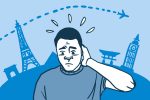In 2014, I studied in Istanbul, which I could not have done without my university’s study abroad program. The staff helped immensely to guide us through the preparations for leaving the U.S. I have distinct memories of endless Google searches for Turkish visa requirements. I ended up having to mail my passport halfway around the world to get it.
Luckily, the staff at my school was very helpful, and my arrival to Istanbul went smoothly. In retrospect, the bureaucratic purgatory I endured wasn’t all that bad. Those who choose to study abroad today likely have a harder time, especially with the current foreign policy in place.
The federal government’s foreign policy has certainly made an impact on American and international study abroad programs. During his trip to Davos last week, President Trump told the World Economic Forum that “America First does not mean America alone.” I’m not sure what kind of reassurance he thought he was giving to the global economic elite with that one. It still sounds like something that’s, at the very least, influenced by nationalism. His rhetoric may prove to be detrimental in the future of studying abroad.
Tom Martinek Jr., associate director of the study abroad program at the University of North Carolina at Greensborn (UNCG), answered a few questions about how Trump’s “America First” agenda — as well as his general foreign policy — affect college students’ opportunities to study abroad. Martinek writes, “If this direction continues, I feel it will further alienate us from the rest of the world, which means fewer international students and scholars may decide to pursue higher education in the United States.” This response brought on a new question: What about the specific forms of foreign policy that affect study abroad programs?
The answer was, of course, visa requirements. Martinek writes, “Due to new travel and immigration policies being implemented by our new administration, UNCG and higher education in general in the United States have seen a drop in international students choosing to study in the United States.” As fewer foreign students come to American universities, schools will be less likely to keep their study abroad funding. Losing such an asset would devastate those who want to seize the opportunity in their higher education.
Martinek also writes, “For many of our students going abroad, they’re facing increasingly stringent and more complicated visa requirements as other countries are responding to U.S. policies on immigration and visas to come to the U.S. That makes it harder for students to study in the U.S.” When traveling, there’s nothing more terrifying than trying to get a visa. Even if your destination is your native country’s greatest ally, you’re still going to have to make a carbon copy of yourself for the bureaucrats to have on file.

When thinking about traveling to another country, it may be important to have a grasp on the politics of your destination. U.S. politics are important to international students who are thinking about studying abroad. Martinek writes, “Many international students are very aware of U.S. politics and foreign policy, as the decisions we make here have a broader impact around the world.”
An awareness of foreign politics is heightened when someone like Donald Trump manages to take the presidential office. His unpredictable nature gives caution to those who are thinking about studying in America. With fewer opportunities to have students leave and come to the U.S for studious purposes, American students will grow increasingly isolated from the rest of the world.
With the current political climate, people tend to forget how others reacted to past political policies, which can lead to inquiries about whether or not the reactions have changed at all. Student perceptions of the Obama administration versus the perceptions of his successor’s have shifted negatively. Martinek writes, “In general, I feel the current administration is not seen in a positive light in the ways that the Obama admin was.”
How might the current president affect the judgment of foreign students? Would they feel alienated in a country with a president who uses such nationalistic rhetoric, such as his plan to have a “merit-based” immigration system? After all, these merits will be, as Trump said, “based on their ability to contribute to our economy, to support themselves financially and to strengthen our country,” which could make foreigners feel uncomfortable.
It’s no secret that a country that’s becoming increasingly isolated is having difficulties with its university’s study abroad programs. However, it can be hard to find all the ripples in the sea of absolute madness that is the modern news landscape. Due to our current political climate, students who have studied abroad may have realized they should not to take their opportunity to travel for granted.

















